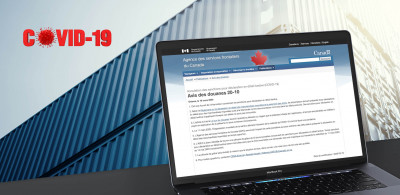Considering the global COVID-19 pandemic, W2C thought it important to provide guidance to importers and exporters on certain measures recently announced by the Canadian government.
The Canada Border Services Agency (CBSA) recently issued four (4) Customs Notices in relation to the COVID-19 crisis, following official announcements made by the federal government :
- On March 16th, CBSA published Customs Notice 20-08, which provides information on the relief of customs duties and taxes for goods imported for “emergency use” imported by or on behalf of federal, provincial or municipal entities such as centres for healthcare as well as by or on behalf of members of first response organizations such as police, fire and local civil defence groups, including medical response teams.
- On March 18th, CBSA published Customs Notice 20-09. For importers undergoing a CBSA compliance audit and who recently received an audit report requiring corrections to be filed with CBSA within a 90-Day period; this statutory period has been automatically extended by 30 days, for a total of 120 days.
- On March 19th, CBSA published Customs Notice 20-10. CBSA is granting a 45-day (business days) grace period for late accounting penalties, which applies to transactions released from March 11, 2020 to May 14, 2020, inclusively. CBSA clients will not have to submit individual applications to have late accounting penalties waived for this period.
- On March 27th, CBSA published Customs Notice 20-11. This notice provides information regarding the extension of timeframes for the payment of customs duties and the Goods and Services Tax (GST). The timeframe for all payments due to the CBSA (e.g., customs duties and GST on regular imports, re-assessments, penalties, etc.) are extended to June 30, 2020. This also includes charges on the statement of account of March due on April 1, 2020. [Important: see additional remarks below.]
Additional Remarks :
Other tariff classification options :
Importers not eligible for the Goods for Emergency Use Remission Order mentioned in point no.1 above, may want to review already existing guidelines for tariff classification of Goods to be employed in a Noxious Atmosphere, which may alleviate customs duties for eligible goods. For possible exemptions of GST on importations of Medical and Assistive Devices, click on Zero-Rated Supplies and scroll down to Part II.
Extended Payment Timeframes:
Regarding the extension of timeframes for payment of duties and taxes mentioned in point no.4 above; certain customs brokers, including W2C, may not agree to afford extended timeframes to customers in cases where importers have not secured their import duty and tax disbursements using one of the available direct payment options offered by the CBSA, (i) the Importer Direct Security program or (ii) the GST Direct program, but rather the duties and taxes are secured with the CBSA through the customs broker’s security.
For importers who do not participate to either of the direct payment options with the CBSA, in spite of the extended payment period offered by CBSA, the customs broker still carries the risk of payment of duties and/or taxes to the CBSA, should client-importers default on their payments due the customs broker.
Therefore, for importers with significant outlays of customs duties and GST, many brokers will encourage these clients to obtain an annual Customs Bond from an approved surety and participate to the Importer Direct Security program, enabling the importer to secure its duty and tax disbursements directly with the CBSA and thereby profit from the aforementioned extended payment timeframes. Alternatively, for those importers that only incur GST disbursements on their importations, customs brokers may insist on mandatory participation to the GST Direct option.
For duty and tax outlays not secured with CBSA through one of the approved direct payment options, W2C may request payment in advance (before transmittal of release requests) from the customer, before we will allow duties and taxes to be secured on our customs broker’s security.
In closing, under the new CARM initiative that is progressively being implemented by the CBSA, the agency will eventually require that all importers post a Customs Bond and pay the CBSA directly for all amounts of duties and taxes owing on their importations. The COVID-19 crisis will simply accelerate the transition to the bond and direct payment requirement.
For additional information, go to:
Release Prior to Payment Privilege – Memorandum D17-1-8 (See paragraphs 31-50 for information on CBSA’s direct payment options)
CBSA - Commercial Payments and Accounts
CBSA Assessment and Revenue Management (CARM)
Do not hesitate to contact your W2C representative for more information on direct payment options and how to take advantage of the extended payment timeframes offered by CBSA.

